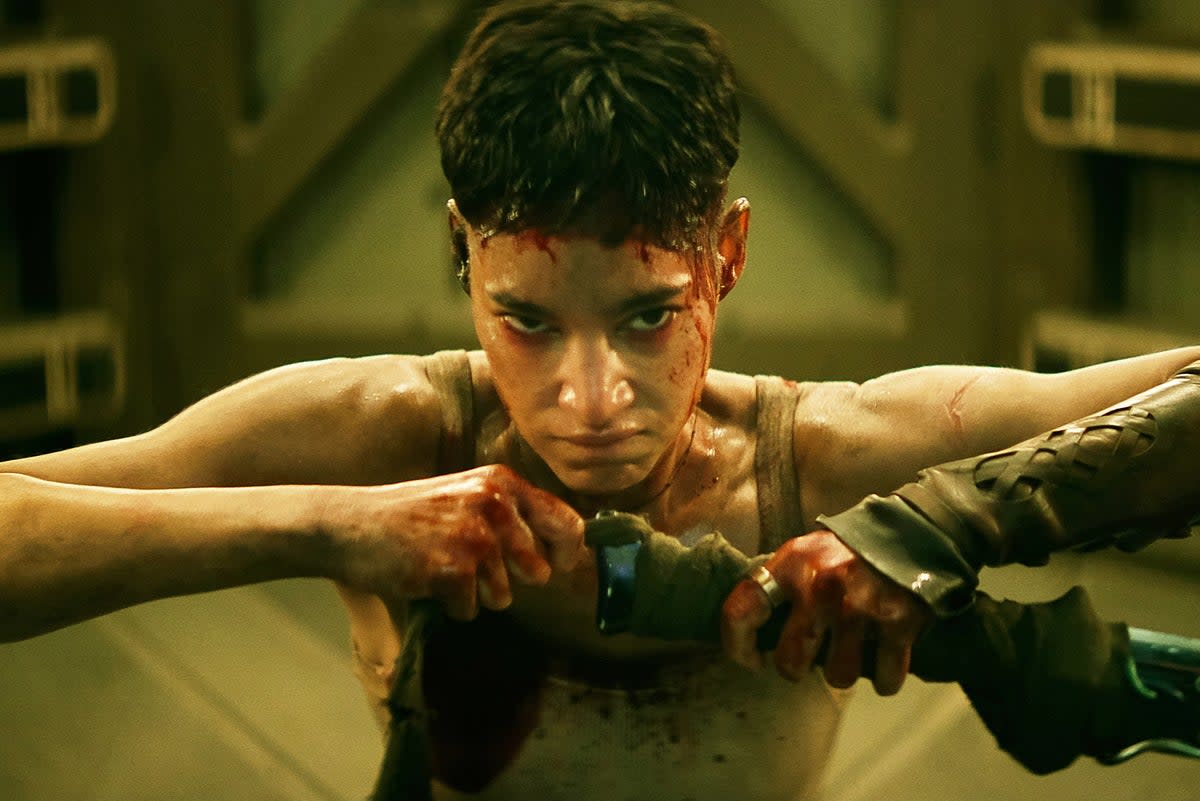Rebel Moon is a Star Wars rip-off that dares to break George Lucas’s unwritten rule

Rebel Moon wasn’t always a brazenly obvious Star Wars knock-off. At one point, it was the real McCoy. Zack Snyder’s sci-fi thriller (the second part of which, The Scargiver, debuted on Netflix on Friday) was originally conceived as an official entry in the Star Wars canon. Shortly after the land rights to George Lucas’s galaxy far, far away were hoovered up by Disney in 2012, Snyder tried pitching them his premise: the story of a modest farming community who fight back against imperial invaders. The Man of Steel filmmaker’s idea was turned down, as were his pitches for a video game adaptation of the same. One quick de-branding later – a “find and replace” on a few Lucasian nouns – and the script was sold to Netflix as its own original saga.
You could argue that Rebel Moon is no less a rip-off than Star Wars itself, with the original 1977 classic having borrowed its story from Akira Kurosawa’s The Hidden Fortress. Kurosawa is, as our critic Clarisse Loughrey notes in her review, a towering influence over Rebel Moon, with the film following the plot of Seven Samurai almost beat for beat. (Star Wars has borrowed this structure too, most overtly in several different episodes of The Mandalorian.) But there’s a caveat. For all Rebel Moon’s shameless pilfering, there are times it goes places where Star Wars never has.
Perhaps the key thing that sets Rebel Moon apart from its multibillion-dollar forefather is its protagonist: war orphan turned imperial super-soldier turned rebel Kora (Sofia Boutella). We meet Kora in the first Rebel Moon with her Imperium days already behind her, haunted by the immorality of her actions. In Part Two, we find out what precipitated her change of heart: she murdered the emperor’s innocent daughter, as part of a coup. Though it’s revealed at the end of the film that this magical pre-teen somehow survived the attack, it’s a pretty dark way to frame a hero. The handling may be blunt and surface-level, but Boutella is nonetheless the kind of harrowed, grey-area protagonist that the Star Wars saga has never dared tackle.
Of course, the idea of redemption has come up time and again in Star Wars, from the moment Han Solo shows up at the end of A New Hope, reneging on his mercenary ways, to the bit at the end of Return of the Jedi when Darth Vader yeets the evil emperor into a chasm to save his son Luke. The Star Wars sequels stuffed a similar redemption arc into the execrable Rise of Skywalker, with Adam Driver’s Kylo Ren abruptly turning back to being a good guy towards the end of the film.
But redemption in Star Wars is also swift and uncomplicated. Much more time and nuance is afforded to the fall from grace – Anakin’s slow lapse into the dark side across the prequel trilogy – than the climb back towards it. Like Kora, Vader is also a killer of children: the moment he massacres a “youngling” in Revenge of the Sith is the point of no return for Anakin Skywalker. Though, of course, he does return. The Force Awakens started with John Boyega’s Finn serving as an Imperial Stormtrooper, but we never see or learn of him carrying out anything malicious himself: he is a reformed man from the very first act, a hero whose only vice is his flightiness. In Star Wars, redemption is something to be grabbed, not earned. What Rebel Moon posits is something messier and less gratifying – but much truer to life.
There is no real moment when Boutella’s character is redeemed; there is no villain’s mask to remove, like the one that cathartically transforms Vader’s face back into the human visage of Anakin. Instead, we see a character who must live with her decisions, who must achieve her redemption slowly, and partially. While Star Wars has dabbled with conflicted and morally dubious heroes in the past – most successfully in the stellar Disney+ series Andor – there is always a sense of triumphalism to it. It is a world divided into the light side and the dark side, and this is always what it boils down to. Rebel Moon has a lot of this binary worldview too (after all, the villains are styled like Nazi officers), but allows itself a little more shade when it comes to heroism.
Ultimately, Rebel Moon exists in a sort of tonal no-man’s land – too shallow and bombastic to be considered adult fare, but a little too dark and violent to be an all-ages crowdpleaser like Star Wars. (And, not to mention, it’s average at best.) But credit must be given where due: it at least tries to take its characters seriously. Star Wars, adrift in a sea of increasingly aimless spin-offs and misfires, could stand to learn a thing or two.
‘Rebel Moon: Part Two – The Scargiver’ is available to stream now on Netflix
